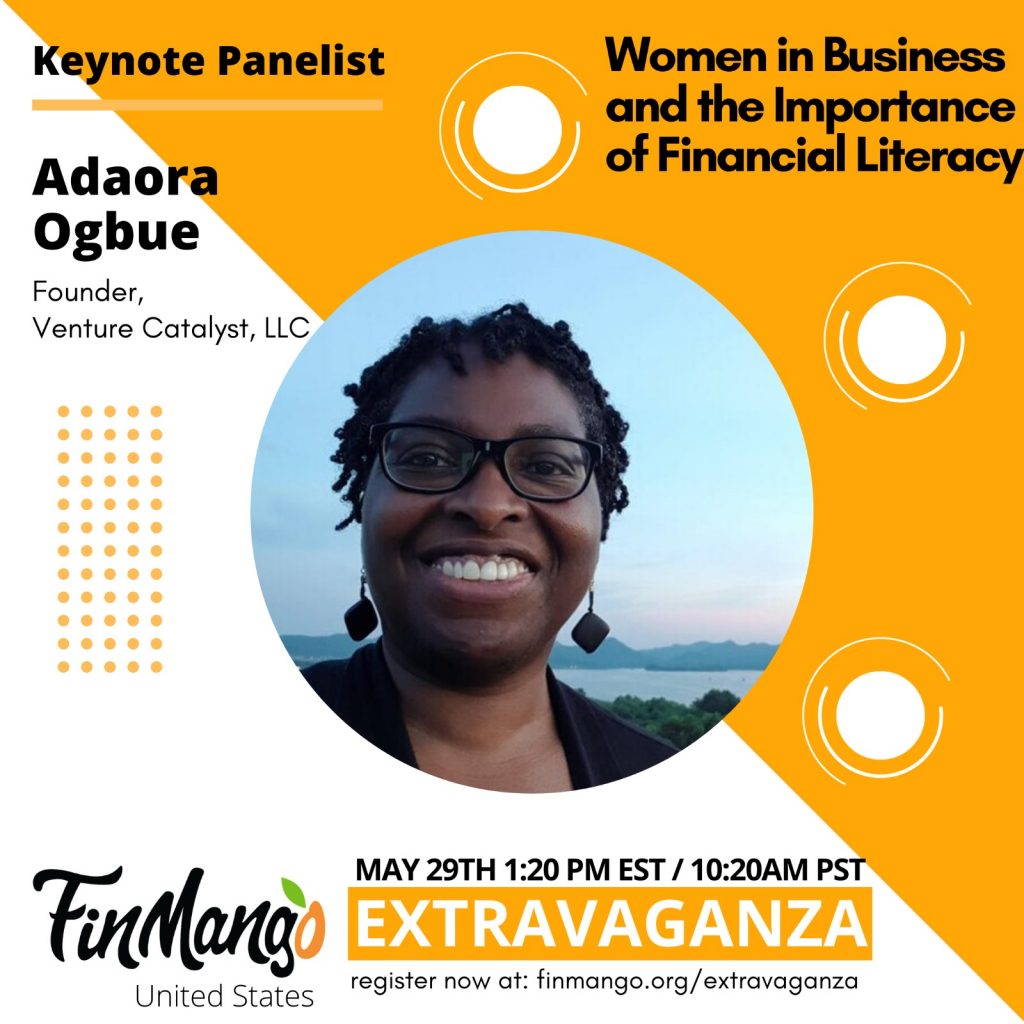
Sources: Finmango, Venture Catalyst, LLC.
Finmango, an Akron, Ohio-based non-profit which promotes financial literacy and financial inclusion in 18 countries, held its first-ever online Extravaganza on May 29th and 30th to educate young people about financial literacy. The free, 24-hour event was streamed on three continents, with participants tuning in to live feeds from South Asia, Sub-Saharan Africa, and the USA. Featuring over 50 speakers and panellists, the sessions covered topics ranging from student credit and wealth management, to finance in the digital economy and the importance of financial literacy in entrepreneurship and in numerous other professions.
On the topic of entrepreneurship, Venture Catalyst, LLC Founder and Principal, Adaora Ogbue, was on hand to share her thoughts during the keynote panel on Women in Business and the Importance of Financial Literacy. Moderated by Finmango student volunteer, Ahana Samat, the panel also included Tahmina Day, Advisory Board Member for SONEAN; Jenny Kim, Deputy General Counsel & Vice President, Public Policy for Koch Industries; and Fern Morrison, a Procurement Analyst at Apple.

Source: Finmango.
When asked whether financial literacy can help to increase the confidence of women founders, thus creating a more representative class of leaders, Ogbue pointed to TD Wealth’s 2018 study on Women and Behavioural Finance, which highlighted the positive correlation between women’s conscientiousness and their financial confidence. According to the report, although only 31% of women surveyed believed themselves to be knowledgeable about finance, women’s tendency to be conscientious gives them the perseverance to set and acquire the goal of becoming financially proficient.
Furthermore, when it comes to increasing diversity and inclusion in leadership, Ogbue recognised that, while progress has been made in the corporate world, there is still much work to be done. Citing Fortune 500 data from February 2020, Ogbue acknowledged that the number of female CEOs in the top 500 US corporations has reached an all-time high of 37. However, she also pointed to the lack of racial diversity among the women on the list as a shortcoming, saying that “the idea of gender balance and gender equality is not just a challenge for women, and it’s not just a challenge for white women.” Ogbue went on to say that the only way to progress in attaining financial and digital inclusion is for everyone to make a concerted effort to achieve those goals together.

Source: Finmango.
In addition, the other panellists provided insights on how new government regulations and corporate initiatives to promote financial literacy can increase female representation on corporate boards and in decision-making for institutional investors, leading to a more equitable and impactful distribution of capital.
First, Morrison shared her observations as a mentor, noting the challenges that women face in corporate settings and how increasing their financial knowledge can help to put them on an equal footing with men in the workplace when it comes to business negotiations. Meanwhile, Day highlighted the ways in which public-private partnerships (PPPs) can be employed to increase opportunities for women to gain access to capital. Similarly, Kim stressed the importance of criminal justice reform in ensuring that incarcerated women have access to the financial literacy tools which will help them to reintegrate into society, while empowering them to support themselves and their families financially.
Towards the end of the discussion, each panellist shared resources and advice targeting the younger generation of female business leaders. In her closing remarks, Ogbue encouraged aspiring female founders and investors to consult the Global Support Ecosystem for Women Entrepreneurs & Investors for financial literacy resources and support networks related to start-up fundraising and investing. Her final message to the audience: “the best way that we can move the needle [on female financial literacy] is to invest in ourselves, [and] to invest in each other as well.”
Source: Finmango.